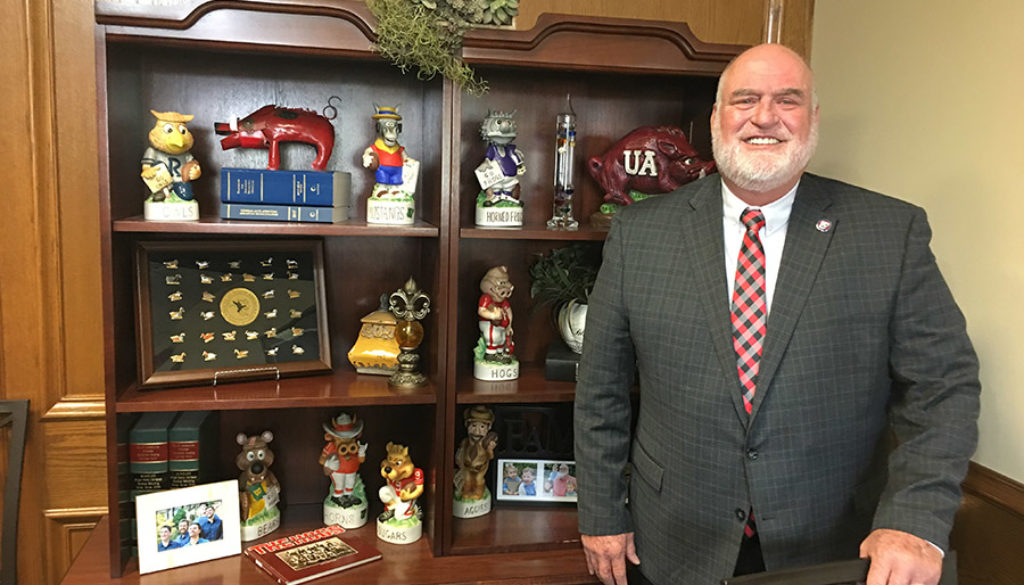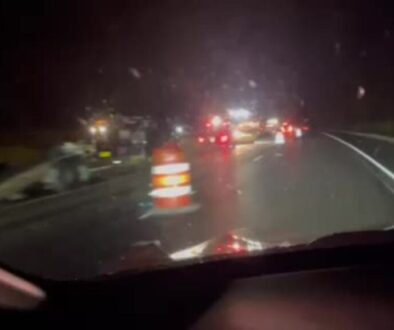RAZORBACKS & ROADS: THEY’RE AMONG THE SUBJECTS JACKSONVILLE MAYOR BOB JOHNSON IS THOROUGHLY PASSIONATE ABOUT

By Bill Paddack
Friendly and engaging, knowledgeable and forthcoming, Jacksonville Mayor Bob Johnson welcomes a visitor to City Hall on a June afternoon and is delighted to explain a story or two behind the Razorback memorabilia in his office.
It’s a terrific time to be discussing University of Arkansas athletics. The day before, the Diamond Hogs beat Ole Miss 14-1 in the winner-take-all NCAA super regional third game at Fayetteville to advance to the College World Series, and a couple of days before that the Razorbacks’ women’s track and field team won the outdoor national championship in Austin, Texas.
A CPA, Johnson holds a master’s degree in accounting from the university and is an ardent Razorback fan. Through the years, he’s followed the Hogs at home and on the road, visiting a great deal of the cities that are home to Southeastern Conference schools as well as those of the old Southwest Conference.
But engage him in a conversation on infrastructure and you’ll find he’s just as passionate about a safe and efficient system of transportation. With the passage of Gov. Asa Hutchinson’s highway plan in the recent legislative session, it’s a great time to be talking about roads as well as the Razorbacks.
Planning
Johnson, you see, brings a unique perspective to a discussion of streets, roads, highways and bridges since he previously served as a state representative and as a member of the Pulaski County Quorum Court. So he’s dealt with infrastructure issues as an elected official on three levels – city, county and state – and he’s a strong advocate for adequate funding whether you’re talking city roundabouts or interstate highways.
No matter whether it’s local or state government, Johnson sees good planning as a key.
“Infrastructure, of course, is very important to any community,” he said. “You have to be really careful and spend your dollars to get the most utility for your citizens. You’ve got to have a master plan to work with your growth. You’ve got to have a good master plan and you’ve got to have the ability to see that through the best you can.”
And when it comes to planning for the future, he suggests, “Don’t look at tomorrow. Look 20 years down the road.”
Potholes
Johnson has worked with Congressman French Hill on getting a portion of Highway 67 from North Little Rock to Walnut Ridge designated as “Future I-57.” And he’s happy, yes, happy, when he hears from his constituents about, of all things, potholes.
“I like ’em to call me. I want ’em to call me,” he said. “How do I know it’s there if they don’t tell me. Our city street department and myself don’t drive every road. We ask the police to let us know. We want to know where they are ’cause if we can fix it we want it fixed. It’s difficult on their cars hitting those potholes. We don’t want them irritated. We want them living here and being happy.”
While in the state Legislature, Johnson, 65, served on the House Public Transportation Committee. He won a runoff election for mayor in December. He gladly fielded a number of questions for us regarding transportation issues in the Natural State.
Good Roads: How important is it for an elected official to have a good working relationship with the Arkansas Department of Transportation?
Bob Johnson: It’s invaluable to have that relationship. You’re wanting to do an exit north of town and want them to partner with you on it. You’ve got to have a working relationship to get those. You have a problem with a road, talk to them about it. You need a road widened, so you’ve got to have that relationship.
Plus, they give grants to cities to do sidewalk projects so you talk to them and explain it to them so when they’re awarding those grants they understand and have a visual of what you’re doing. For a city, you’ve got to have a working relationship. Know your district’s engineer. Get to know them by first name and call them and talk to them. And call them and tell them when they do good.
GR: What do you see as our top needs in terms of infrastructure in Arkansas?
BJ: I do applaud this last legislative session where we’ve done some things to increase money to the highway department. Hopefully, the citizens will vote for extending that half-cent sales tax indefinitely because that is our matching funds to expand freeways, to build new freeways. We’ve got to have those matching funds to do that.
But the biggest need is for overlays and maintenance of your highways. Once you let a highway deteriorate to the point that you have to replace it, that cost goes up four, five, six times per mile. If you could overlay it and do something to keep it from hurting the sub-base, that’s very important. That is our biggest need – having enough money to maintain the highways so they don’t fall apart, they’re travelable, they don’t have to be replaced. It’s a lot cheaper to repair than it is to replace.
GR: What specifically would you fix or build with new infrastructure funding?
BJ: Two or three things. Right now, we’re working on a project that is going to cost more than we anticipated. That’s building a bridge over the railroad tracks. You’re talking about your citizens not having to worry about getting hit by a train. You’re talking about people being able to walk over that bridge. And you get rid of those horns beeping in your town all the time.
Another project I’d love to see us work on if we had more money is more roundabouts. If our drivers would learn how to use roundabouts and would follow what you’re supposed to do, traffic never stops, it flows. When I was on the Quorum Court we built a roundabout out here where Harris Road meets Main Street. The high school is right down the street. We were having wrecks out there all the time. By putting in that roundabout – (former Pulaski County Judge) Buddy Villines and I worked on it, he funded it for us – we haven’t had a serious accident since. With roundabouts, if used properly, traffic flow never stops and there are no wrecks.
